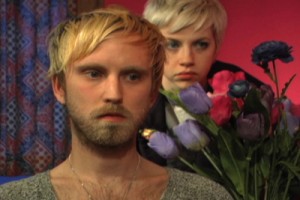I had the honor and pleasure of writing a letter to Latham Zearfoss for his upcoming show Selected Works By Latham Zearfoss this Saturday, September 4 at 7 & 9pm at the Nightengale.
Facebook Invite for “Trust Me: Selected Works by Latham Zearfoss”
Here’s the letter, dated September 1, 2010:
Dear Latham,
A few years ago you sent me a copy of your piece Self-Control (2008). We were supposed to do a studio visit but I didn’t make it. We lost touch. We lived in different parts of the city. We had mutual friends. I watched that piece, Self-Control, on repeat, and cried. I wasn’t sure why. Was art supposed to do that to someone? I put the video away, and it is only now, two years later, that I return to it.
The parts of your work that bring me back are the parts about a queer utopia. There is a hopeful idealism that I am honestly not sure we will reach. When we talked on the phone I asked you about the idea of a queer utopia—an underlying theme in your piece Self-Control, 2008. In this piece, you are visited by somebody from the future. You aren’t sure what to say to this future ghost, so you tell it about 80s pop star, Laura Branigan. As the story goes, a piano falls on Laura while she is recording in her studio. She doesn’t die, but she associates this accident with music, and it scares her, so she stops making music. You take on her ghost, embodying this past for the video. Later on in the video, you place yourself in the space of a talk show host, interviewing “Latham Zearfoss.” Here, you are Aimee Brown. You talk to yourself about what you’re looking for—trust from the viewer, a hopeful idealism towards queer futures. In our conversation the other day, you talked about the word queer—how many different meanings there are, different contexts, the difficulty of pinning down one definition. Some are scared of it, some embrace it. “Queer is such a big word,” you say. “The word queer is very queer in and of itself—it doesn’t fit in neatly anywhere.”
But what does that mean for notions of a queer utopia, as you suggest? What is this space and how can we arrive there, all of us, into this hopeful space of freedom. How can we “have a collective awareness and push for something better,” as you say? And how can we “lie or re-interpret or embellish something that might be considered central, to create something new, and something that our new model for realizing this queer present or future”?
This is a question that I think you can answer through art, and I can’t wait to see it.
Sincerely,
Alicia Eler
Write-ups of Trust Me: Selected Works by Latham Zearfoss
Think Pink Radio (August 26, 2010)




